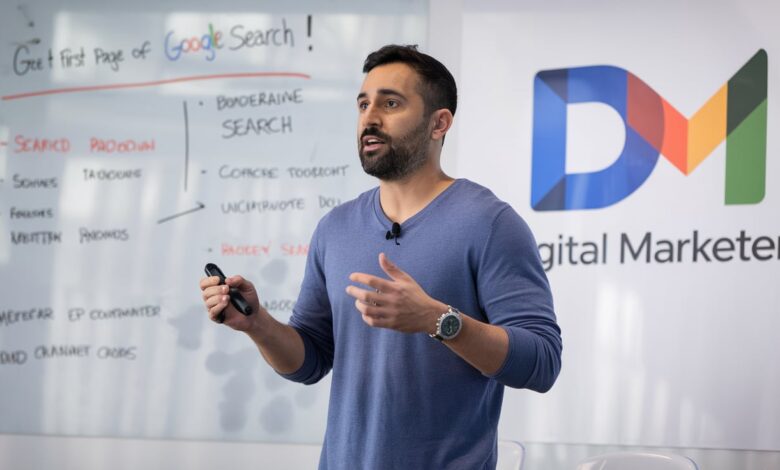How to Get on First Page of Google Search David Aziz: Insights from David Aziz

Understanding Google Search Rankings
Google search rankings are key indicators of how well a website or webpage is positioned in search engine results. Achieving a prominent place on this list is critical for businesses and content creators looking to enhance their visibility. When users input queries into Google, the search engine uses complex algorithms to determine which pages best relate to the terms entered. The goal of these algorithms is to provide users with the most relevant and high-quality content, thereby making search results a crucial battleground for attracting audience attention.
The significance of appearing on the first page of Google search results cannot be overstated. Research indicates that websites ranking at the top attract a lion’s share of clicks, with studies indicating that approximately 75% of users do not scroll past the first page. Consequently, those aiming to capture organic search traffic must prioritize strategies that enable them to secure top-ranking positions. This process involves utilizing search engine optimization (SEO) tactics that focus on quality content, keyword relevance, and user experience. A successful performance in search rankings leads to increased visibility and higher chances of converting visitors into customers.
Additionally, understanding how search engines operate is essential for anyone seeking to improve their online presence. Search engines like Google evaluate vast amounts of data to rank webpages, considering factors such as keyword usage, site speed, relevancy, and backlinks. By adopting best practices that align with these ranking criteria, businesses and content creators can enhance their chances of being discovered and recognized in their respective niches. Striving to learn how to get on the first page of Google search, as highlighted by experts like David Aziz, is ultimately about harnessing organic strategies for sustained growth and success.
Understanding SEO Fundamentals
Search Engine Optimization (SEO) is a critical discipline that aims to enhance the visibility of a website on search engines. The process entails a multitude of components that contribute to a site’s ranking. At the core of SEO lies the concept of keywords—specific terms or phrases that users input into search engines. Identifying and integrating the right keywords effectively can significantly increase a site’s chances of appearing on the first page of Google search results.
Another essential component is metadata, which includes title tags and meta descriptions. These elements provide search engines with concise information about the content on a webpage. Properly crafted metadata not only helps search engines understand the page better but also influences click-through rates from search results, thereby driving more traffic. David Aziz emphasizes the importance of relevant and compelling metadata to attract users while ensuring it aligns with the content presented.
Backlinks also play a crucial role in SEO. These hyperlinks from other websites to your own signal to search engines that your content is credible and authoritative. Cultivating relationships with other websites to secure high-quality backlinks can improve your search ranking markedly. Aziz advises focusing on building a diverse backlink profile and obtaining links from reputable sources to strengthen online presence.
Additionally, user experience (UX) is becoming increasingly important in SEO strategies. Search engines prioritize sites that offer seamless navigation, fast loading times, and mobile optimization. This holistic approach means considering how users interact with your website is essential for ranking. David Aziz integrates UX principles into his optimization techniques by ensuring that visitors find relevant content easily and experience a pleasant interaction with the site.
Keyword Research: Finding Your Target Audience
Keyword research is a critical step in any SEO strategy, particularly for those aspiring to understand how to get on the first page of Google search. By identifying relevant keywords, businesses can align their content with what potential customers are actively searching for. This not only enhances visibility but also ensures that the target audience is effectively reached. David Aziz emphasizes that a focused approach to keyword research can pave the way for impactful content that attracts organic traffic.
To initiate the keyword research process, one should start by using various keyword research tools. Popular options include Google Keyword Planner, Ahrefs, and SEMrush, which provide insights into search volume, competition, and related keywords. By entering a base keyword, these tools generate a list of potential keywords and phrases that are relevant to the topic of interest. This is crucial for understanding which terms your audience is using and how to tailor your content accordingly.
Moreover, it is essential to understand the concept of search intent. Not all keywords carry the same level of intent. They can be categorized into informational, navigational, and transactional intents. For instance, if someone searches for “how to get on first page of Google search David Aziz,” they are likely looking for guidance and solutions. Recognizing this intent enables marketers to create content that meets users’ needs, making it more likely to rank highly.
David Aziz advocates for a balance between high-volume and long-tail keywords. While high-volume keywords can potentially drive significant traffic, long-tail keywords often present lower competition and can lead to higher conversion rates due to their specificity. By strategically selecting a mix of these keywords, you can better position your content for visibility on search engines, ultimately supporting your goal to get on the first page of Google search.
On-Page SEO Techniques to Implement
On-page SEO plays a crucial role in determining how to get on the first page of Google search, and implementing effective techniques can significantly enhance your site’s visibility. One of the fundamentals involves optimizing your titles and headers. Titles should not only intrigue but must also incorporate relevant keywords. For example, consider utilizing phrases such as “how to get on first page of Google search” or its synonyms within the title to resonate with both the audience and search engines. Proper header tags (H1, H2, etc.) help structure the content and guide readers, while also signaling to search engines the hierarchy of information provided.
The content itself must be well thought out and compelling. Quality content is essential; it should provide value to the audience while naturally integrating keywords throughout the text. Avoid the pitfalls of keyword stuffing. Instead of overloading your content with exact phrases like “how to get on first page of Google search,” aim for a natural flow, using relevant synonyms and related terms that still denote the same meaning. This strategy will increase readability and reduce bounce rates, as users are more likely to engage with content that is lucid and informative.
Additionally, structuring your articles correctly enhances their ranking potential. Utilize bullet points, lists, and images accompanied by appropriate alt text to break up large blocks of text. This not only makes it easier for readers to digest information but is also favorable in the eyes of search engine algorithms. According to insights derived from David Aziz, integrating these on-page SEO strategies effectively can lead to substantial improvements in your website’s search engine rankings. By prioritizing quality, relevance, and proper structure, you will create a strong foundation that facilitates achieving top placements in search results.
Creating Quality Content that Engages
In the realm of digital marketing, the significance of high-quality content cannot be overstated. To effectively improve your rankings and achieve visibility, understanding how to get on first page of Google search is paramount. A pivotal strategy involves creating engaging content that resonates with your audience’s needs and preferences. This encompasses various formats such as blog posts, videos, infographics, and podcasts, each serving distinct purposes to captivate the audience.
Blog posts are often the cornerstone of content marketing strategies. They not only provide valuable information but also allow for the integration of targeted keywords, which are essential for improving search engine rankings. Crafting informative and captivating blog content creates opportunities for audiences to interact and allows the writer to establish authority in their niche, ultimately aiding in achieving higher search engine positions. Similarly, videos and infographics can enhance user engagement, as they transform complex ideas into easily digestible formats, appealing to visual learners and maximizing retention rates.
Moreover, storytelling emerges as a vital component in content creation. By weaving narratives into your content, you can create emotional connections with your audience, fostering loyalty and encouraging sharing across platforms. David Aziz emphasizes the importance of storytelling as a means of compelling engagement, reminding content creators that the delivery of the message is just as important as the information itself. Through relatable characters and vivid scenarios, content can become memorable, maintaining audience interest and fulfilling their quest for value.
Ultimately, the quality of your content is what drives SEO success. Focusing on creating valuable, engaging, and well-structured content, while employing diverse formats and storytelling techniques, can significantly enhance your chances of learning how to get on first page of Google search, following the proven principles shared by experts like David Aziz.
Building Backlinks for Authority and Trust
Backlinks, often referred to as inbound links or incoming links, are hyperlinks from one website to another. They serve as a crucial factor in search engine optimization (SEO) and are integral to understanding how to get on first page of Google search, as emphasized by David Aziz. When a website includes a link to yours, it signals to search engines that your content is valuable and trustworthy. Consequently, acquiring quality backlinks can significantly improve your website’s ranking on search engine results pages (SERPs).
The importance of backlinks cannot be overstated. They contribute to a website’s authority and credibility, which are critical for achieving visibility and attracting organic traffic. Search engines, particularly Google, utilize backlinks as a key ranking criterion. The more credible sites link to your content, the more likely it is that your website will be viewed as a relevant authority in your niche. As such, a solid backlink strategy is essential for anyone seeking to understand how to get on first page of Google search, and this is a concept well articulated by How to Get on First Page of Google Search David Aziz in his approach.
To effectively acquire backlinks, there are several techniques one can deploy. One of the most effective methods is guest blogging, where you contribute content to other reputable blogs within your industry. This not only positions you as an expert but also provides an opportunity to include backlinks to your own site. Further, building relationships with influencers and other content creators in your niche can foster collaboration and mutual linking opportunities. Engaging with online communities and participating in forums relevant to your field can also yield valuable backlinks. By employing these strategies diligently, you can enhance your website’s authority and increase your chances of appearing on the coveted first page of Google search results, reflecting David Aziz’s insights on the matter.
Monitoring Performance and Making Adjustments
In the realm of search engine optimization (SEO), monitoring performance is a crucial step that cannot be overlooked. Implementing the right strategies to get on the first page of Google search is just the beginning; continuous assessment and adjustments based on data-driven insights are essential for long-term success. Tools like Google Analytics and Google Search Console are invaluable in this process, providing comprehensive metrics to evaluate the effectiveness of your SEO efforts. These platforms allow users to track visitor behavior, analyze traffic sources, and understand which keywords are driving engagement.
One of the primary metrics to monitor is your keyword rankings. This information helps you identify where your site stands concerning specific terms you are targeting. For instance, if you’re learning how to get on the first page of Google search David Aziz, observe how your ranking fluctuates over time for this particular keyword. Notably, assessing the click-through rates (CTR) from search results can provide insights into how effectively your titles and meta descriptions capture user interest. Furthermore, monitoring bounce rates reveals whether visitors find your content relevant and engaging.
Another crucial aspect to evaluate is user behavior on your site. Bounce rates and average session durations indicate how well your content resonates with visitors. If users leave quickly, it may signify a disconnect between what they expected and what was provided. Adjusting your content strategy based on these findings is vital for improving rankings. David Aziz suggests focusing on optimizing for user experience as it directly impacts your search rankings. By regularly revisiting your analytics and making necessary adjustments, you can refine your approach, ensuring sustained visibility and effectiveness in how to get on the first page of Google search.
Staying Updated with SEO Trends
In the ever-evolving landscape of digital marketing, understanding how to get on the first page of Google search is intricately linked to staying updated with the latest SEO trends. Search engine optimization (SEO) is not a one-time effort but a continuous process that requires marketers and website owners to adapt to frequent algorithm changes and industry developments. These changes can have significant implications for website rankings, making it imperative to stay well-informed.
One of the most effective ways to keep abreast of SEO updates is by following reliable sources of SEO news. Reputable blogs, forums, and websites dedicated to digital marketing often provide insights into algorithm changes instituted by search engines, including Google. Platforms such as Moz, Search Engine Journal, and Google’s official Webmaster Blog publish timely articles that inform readers about crucial updates, guidelines, and best practices.
In addition to these sources, subscribing to newsletters, following SEO influencers on social media, and participating in relevant webinars can further enhance one’s knowledge base. Industry leaders such as David Aziz often share valuable insights on maintaining relevance in SEO practices, underscoring the importance of continual learning and adaptation. Engaging in communities focused on SEO can also help individuals exchange knowledge and experiences that contribute to a more nuanced understanding of effective strategies.
Moreover, keeping an eye on competitors can provide a benchmark for understanding shifts in SEO trends. Analyzing what strategies are yielding results for others can offer valuable lessons in how to refine one’s own approach. By integrating these practices, individuals can not only enhance their SEO knowledge but also substantially improve their chances of achieving desirable rankings in search engine results. Ultimately, staying updated with SEO trends is essential for anyone looking to effectively navigate how to get on the first page of Google search.
Conclusion: Your Path to the First Page
Reaching the coveted first page of Google search results is a goal many individuals and businesses strive to achieve. Throughout this article, we have explored various strategies and techniques that can significantly improve your chances of attaining this objective, drawing insights from the experiences and advice of David Aziz, a recognized expert in the field of search engine optimization (SEO).
One of the primary takeaways is the importance of content quality. Creating high-quality, engaging, and relevant content is pivotal in attracting both users and search engines. As David Aziz emphasizes, well-crafted content not only serves the reader’s needs but also enhances visibility on search engines. Additionally, employing keyword optimization techniques without resorting to keyword stuffing can help improve content ranking.
Furthermore, the significance of website optimization cannot be overstated. Factors such as site speed, mobile-friendliness, and user experience play a vital role in determining search engine rankings. Ensuring that your website complies with the latest guidelines and best practices recommended by SEO experts is critical.
Persistence is another essential attribute for success in SEO. The journey to get on the first page of Google search results can be long and arduous. It requires continuous learning, adapting to evolving algorithms, and adjusting strategies accordingly. Embracing the insights from David Aziz’s journey can serve as motivation for those committed to excelling in this competitive landscape.
In conclusion, achieving a first-page ranking on Google is not merely about implementing a few tricks. It is a comprehensive process that hinges on consistent effort, strategic planning, and robust content creation. By integrating the strategies discussed and reflecting on David Aziz’s experiences, readers can embark on their path to success in the dynamic world of SEO.
You May Also Read This Techzonepro.



